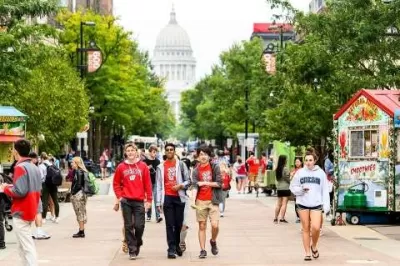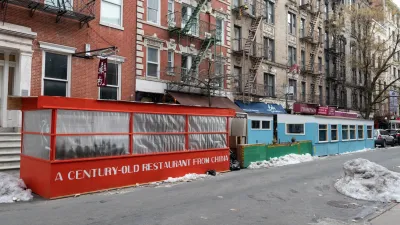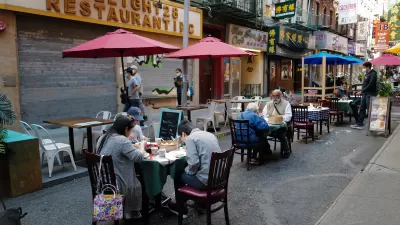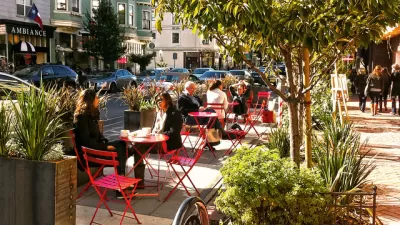Food trucks, outdoor dining spaces, and parklets are moving the needle toward more people-friendly cities and less car-oriented streets.

Using Madison, Wisconsin’s Library Mall as an example, Kyle Hoff points out the connection between food trucks and pedestrian- and cyclist-friendly spaces in an article in the Congress for New Urbanism’s Public Square. “For most Americans, food trucks or pop-up tents at an occasional event like farmers markets are the closest thing they will experience to a permanent outdoor market/public plaza like those that can be found more frequently in European cities and elsewhere in the world.”
Food trucks, Hoff points out, thrive in pedestrian-friendly areas with rich foot traffic. As the natural experiment prompted by the Covid-19 pandemic showed, outdoor dining and parklets can boost activity at local restaurants and businesses.
For Hoff, “This is just one example of how pedestrian-friendly design is great for entrepreneurs, pedestrians, and cities as a whole.” As a civil engineer, Hoff urges their peers to design roads and public spaces to encourage activity like food trucks by “narrowing drive lanes, removing on-street parking in cases where the space can be used more efficiently and profitably, and implementing other design measures to make driving fast in cities uncomfortable, and make being outside of a car more comfortable.”
FULL STORY: Food trucks and people friendly cities

Trump Administration Could Effectively End Housing Voucher Program
Federal officials are eyeing major cuts to the Section 8 program that helps millions of low-income households pay rent.

Planetizen Federal Action Tracker
A weekly monitor of how Trump’s orders and actions are impacting planners and planning in America.

Ken Jennings Launches Transit Web Series
The Jeopardy champ wants you to ride public transit.

Crime Continues to Drop on Philly, San Francisco Transit Systems
SEPTA and BART both saw significant declines in violent crime in the first quarter of 2025.

How South LA Green Spaces Power Community Health and Hope
Green spaces like South L.A. Wetlands Park are helping South Los Angeles residents promote healthy lifestyles, build community, and advocate for improvements that reflect local needs in historically underserved neighborhoods.

Sacramento Plans ‘Quick-Build’ Road Safety Projects
The city wants to accelerate small-scale safety improvements that use low-cost equipment to make an impact at dangerous intersections.
Urban Design for Planners 1: Software Tools
This six-course series explores essential urban design concepts using open source software and equips planners with the tools they need to participate fully in the urban design process.
Planning for Universal Design
Learn the tools for implementing Universal Design in planning regulations.
Heyer Gruel & Associates PA
Ada County Highway District
Institute for Housing and Urban Development Studies (IHS)
City of Grandview
Harvard GSD Executive Education
Toledo-Lucas County Plan Commissions
Salt Lake City
NYU Wagner Graduate School of Public Service





























